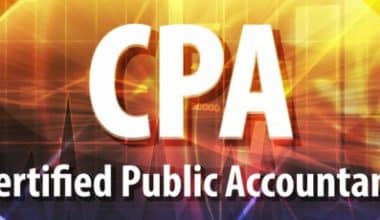What career options do I have? Will my paycheck be sufficient once I complete my degree? Is this worth it?
Every student invests considerable time and money and works hard to earn their degree, and ponders these questions when deciding to enroll in any degree program. If you possess good numerical skills and want to step into the business world, consider pursuing a career as a financial accountant. Financial accountants are individuals responsible for recording, preparing, reporting, and maintaining a business’s financial transactions.
How to become a financial accountant?
Your first step in becoming a financial accountant requires earning a bachelor’s degree in finance, accounting, or a related field. After completing your degree, you can gain experience by applying for entry-level jobs such as accounting clerks or bookkeepers. However, if you wish to secure advanced job positions in the finance sector, you must obtain a highly-valued Certified Public Accountant (CPA) certification.
And while it is true that passing a CPA exam is no cakewalk, signing up for a CPA review course can increase your possibility of acing the exam. However, the good news is that various CPA test prep providers help students in their exam journey. So you can register for the one that best aligns with your learning goals. Are you feeling confused among the top CPA review programs? Comparing Wiley vs Becker can help you make the right decision.
Fortunately, financial accountants can work in a wide range of industries. Below is the list of common financial accounting careers individuals can consider:
FINANCIAL MANAGER
Financial managers are responsible for generating financial reports and establishing strategies based on reports to benefit businesses with long-term financial health. Therefore, having good analytical and problem-solving skills is necessary to excel in this career. Furthermore, you must also have a strong understanding of the financial system and business administration. These individuals can work in law firms, construction industries, educational organizations, insurance companies, charities, and health organizations. Typical job responsibilities include:
⦁ Collect and interpret financial information
⦁ Offer guidance to management on investment opportunities
⦁ Ensure the company complies with financial laws and regulation
⦁ Develop and maintain the financial system
⦁ Prepare the company’s budget and look for cost-reduction opportunities
According to the Bureau of Labor Statistics (BLS), the average salary of a financial manager is $134,180 per year, and the job outlook would grow by 17% from 2020 to 2030.
FINANCIAL ANALYST
Financial analysts are in charge of analyzing financial data to help the business make sound decisions. These professionals assist the company in making decisions about expanding funds and making profits. If you have strong analytical and data-gathering skills, this career option might be perfect for you.
Being proficient in Microsoft Office suites and financial software tools can take your career to the next level. In addition, you must possess excellent communication, time management, leadership, and presentation skills to perform well in your role. The day-to-day job duties of a financial analyst can include the following:
⦁ Gather and analyze financial data
⦁ Identify financial performance and offer recommendations for improvement to management
⦁ Work together with other finance and accounting team to review financial information and make a forecast
⦁ Develop a financial model and explore investment opportunities
The median wage of a financial analyst is $83,660 per year, and job employment would grow by 6% from 2020 to 2030.
MANAGEMENT ACCOUNTANT
If you wish to keep tabs on the organization’s expenses and secure an advanced job position with a high level of responsibilities, this career might be the best fit for you. Management accountants are primarily decision-makers, strategists, and risk managers. They generally oversee low-level accountants that perform basic accounting tasks. These professionals work for governmental, public, and private agencies. However, to become eligible for this job, you must possess a strong aptitude to play with numbers and be adept at managerial accounting, strategic planning, and risk management. On a given day, your day-to-day job responsibilities may include:
⦁ Assess and communicate the current financial position of the organization
⦁ Work collaboratively with the general management of organizations to discuss business plans
⦁ Collect and interpret information to provide in-depth insights into business performance
⦁ Come up with cost-effective financial policies and enforce them
⦁ Ensure the financial policies and regulations comply with regulatory standards
Being a management accountant, you can expect a median salary of $65,616 each year.
CONTROLLER
A financial controller is a senior-level manager and lead accountant whose responsibility is to monitor everyday financial operations and prepare accurate financial statements. At times also known as company historians, these professionals manage the accounting function and are responsible for streamlined accounting processes. However, that’s not it. The job responsibilities of controllers are pretty diverse. For small-scale organizations, these professionals handle intricate accounting tasks, ones that are beyond the capacity of bookkeepers. Whereas for large-scale organizations, controllers work alongside CAO, CFO, and treasurers to manage the administration and finance function. The typical job responsibilities of a financial controller are:
⦁ Recruit and train staff that work in the finance function
⦁ Partake in the budgeting process and meet the tax and permit requirements
⦁ Create financial strategies that comprise opportunity forecasting and risk minimization plans
⦁ Monitor income statements and oversee internal controls
⦁ Come up with financial reviews and give financial advice
According to Payscale, the average base salary of financial controllers is $86,679 per year.
AUDITOR
An auditor refers to an authorized person who checks the validity of an organization’s financial statements. Not only this, but they also highlight disparities in accounting methods, shield the business from fraud, and ensure that the organization adheres to the tax regulations.
These professionals specialize in different areas; for example, some auditors specialize in risk management or assurance services. In contrast, others specialize in specific fields such as healthcare, education, etc. However, there are four main types of auditors: internal, external, forensic, and government. The typical job duties include:
⦁ Collect and assess previous accounting reports, accounting data, receipts, documentation, and flowcharts
⦁ Pinpoint loopholes and suggest cost savings and risk aversion measures
⦁ Identify the strengths and weaknesses of a business and report them to the management and provide suggestions to fix these issues
As an auditor, you can expect an average salary of $58,455 per year. However, to acquire this job role, you must possess business acumen, professional skepticism, excellent problem-solving skills, and strong communication skills.
FINAL THOUGHTS
Pursuing a career in financial accounting can offer you various career opportunities. Thus, you can enjoy job security and high earning potential by becoming a financial accountant. However, apart from field knowledge, you must also develop and polish other soft skills to succeed in your career. For instance, you must have excellent communication, analytical, organization, and attention-to-detail skills. Moreover, you must stay abreast of the latest industry trends and information to help your organization prepare the best tax strategy and ensure the company’s financial health remains good.






